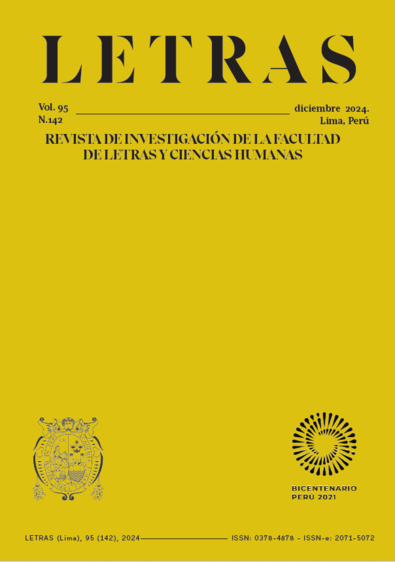The Human Condition in Female Narrators of the Special Period: Anthropogenesis in La nada cotidiana (Zoe Valdes) and Habana año cero (Karla Suarez)
Abstract
This article analyzes the novels The Everyday Nothing (Zoé Valdés, 1998 [1995]) and Habana Year Zero (Karla Suárez, 2016 [2012]), narratives framed in the Cuban social and economic crisis known as the Special Period in Times of Peace. The study explains the formation of the human condition and the functioning of anthropogenesis in the stories. To do this, it uses Hannah Arendt’s theory set forth in the book The Human Condition (2009 [1958]), specifically the notions related to the formulation of man’s active life through three fundamental dimensions: labor, work and action. The work also relies on elements of the classical tradition present in the Platonic dialogue Protagoras, specifically regarding the myth of Prometheus and the values that constitute humans themselves in Western culture: reason, technique, moral virtue and justice. The analysis concludes the preeminence of an anthropogenic process characterized by the inhibition of the instincts of the human being, the clinging to the classic values of humanistic thought, and the consequent inadaptation to the predominant animalizing influence in the context of the crisis; Likewise, it emphasizes the underlying conception that splits man into two irreconcilable and opposing natures (the divine and the earthly), and the practical results of such opposition.Downloads
Métricas alternativas
References
Agamben, G. (2006). Lo abierto: el hombre y el animal. Adriana Hidalgo.
Arendt, H. (2009 [1958]). La condición humana. Paidós.
Campuzano, M. L. (1998). La mujer en la narrativa de la revolución: ponencia de una carencia. En M. Yáñez y M. Bobes (Comps.), Estatuas de sal: cuentistas cubanas contemporáneas: panorama crítico 1959-1995 (p. 351 ss). Ediciones Unión.
Ferriol Muruaga, A. (1998). Cuba: crisis, ajustes y situación social (1990-1996). Editorial de Ciencias Sociales.
Fornet, J. (2003). La narrativa cubana entre la utopía y el desencanto. Hispamé- rica, 32(95), 3-20.
Orr, B. (2007). La masculinidad en crisis: un estudio sobre el deterioro del sujeto masculino en La nada cotidiana (1995) de Zoé Valdés. Caribe: Revista de Cultura y Literatura, 10(1), 65-84.
Platón. (2019). Protágoras. https://ebooket.com.
Portela, E. L. (2017). Con hambre y sin dinero. Ediciones Unión.
Rubio Cuevas, I. (2001). La doble insularidad de los novísimos narradores cubanos. En Congreso La isla posible: resumen de actos del congreso. III Congreso de la Asociación Española de Estudios Literarios Hispanoamericanos, Isla de Tabarca (Alicante) del 25 al 28 de marzo de 1998 (pp. 547- 554). Asociación de Estudios Literarios Hispanoamericanos.
Sábato, E. (2006). El escritor y sus fantasmas. Seix Barral.
San Agustín. (2007). Confesiones. librosenred.com. http://www.iesdi.org/universidadvirtual/Biblioteca_Virtual/Confesiones%20de%20San%20Agustin.pdf
Sánchez Becerril, I. (2012). Consideraciones teórico-críticas para el estudio de la narrativa cubana del Período Especial. Literatura: teoría, historia, crítica, 14(2), 83-112. https://repositorio.unal.edu.co/handle/unal/71951
Silva León, A. (2008). Breve historia de la Revolución Cubana 1959-2000. Félix Varela.
Sklodowska, E. (2016). Invento, luego resisto: El Período Especial en Cuba como experiencia y metáfora (1990-2015). Cuarto Propio.
Suárez, K. (2016 [2012]). Habana año cero. Ediciones Unión.
Todorov, T. (1974). Tipología de la novela policial. Revista Fausto, 3(4).
Uxó, C. (2010). Los novísimos cubanos: primera generación de escritores nacidos en la Revolución. Letras Hispanas: Revista de literatura y de cultura, 7(1), 186-198.
Valdés, Z. (1998 [1995]). La nada cotidiana. Emecé.
Copyright (c) 2024 Letras (Lima)

This work is licensed under a Creative Commons Attribution 4.0 International License.
Este obra está bajo una licencia de Creative Commons Reconocimiento 4.0 Internacional



















